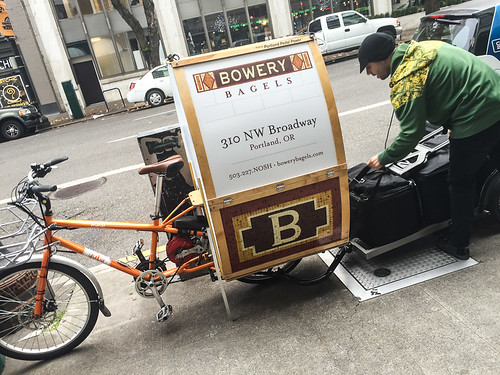
(Photos © J. Maus/BikePortland)
Welcome to “Bikes at Work,” our ocassional series that looks into the people and companies that use bicycles to get work done.
When it comes to delivering food to downtown businesses, bicycles are perhaps the perfect vehicle for the job. Major national chains like Domino’s Pizza and Jimmy John’s have figured this out, as have local ones like Old Town Pizza.
And then there’s Portland Pedal Power, a business that have carved out a nice niche for itself by keeping office workers satiated. We first wrote about this company back in 2007 when they started home delivery of groceries for People’s Food Co-op customers. Today Portland Pedal Power has a fleet of cargo bikes with custom-made enclosures and they’re a full-fledged food delivery, catering, and marketing business. They have partnerships in place with dozens of restaurants and they also offer advertising on the side of their eye-catching bikes.
Advertisement
On my way into work today I met one of Portland Pedal Power’s riders, Sky Miles. I often see the PPP bikes downtown, but what caught my eyes this morning was the loaded trailer attached to Sky’s bike. It was well before lunch-hour so I was curious what Sky was delivering. He told me he was stocking the office kitchen for Elemental Technologies, a software firm with its headquarters on Southwest Broadway.
As Sky packed up his rig I checked out the set-up: It was a stout Surly cargo trailer attached to an even stouter Yuba Mundo cargo bike equipped with a Stokemonkey electric-assist motor. Between the enclosure and the four large thermal bags on the trailer, Sky can carry a serious amount of provisions…
— Jonathan Maus, (503) 706-8804 – jonathan@bikeportland.org



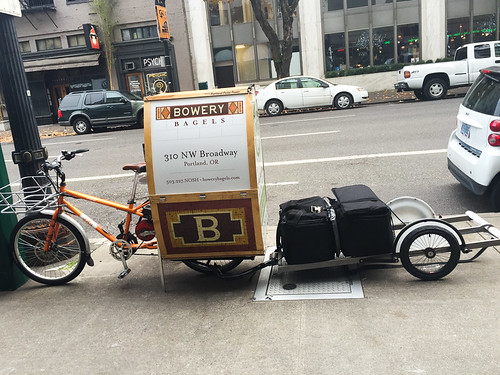
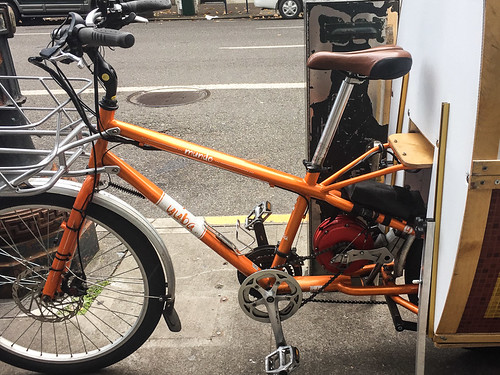
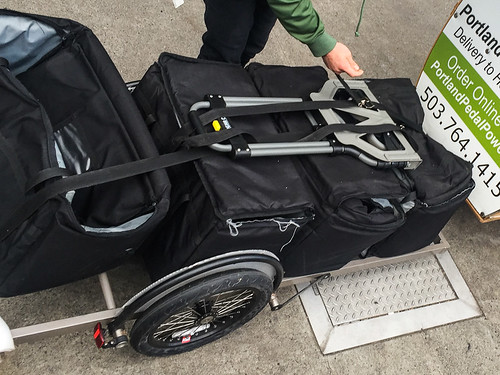

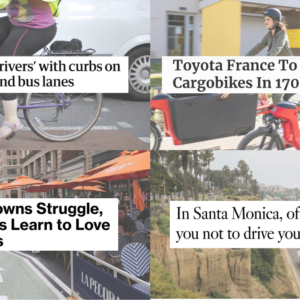
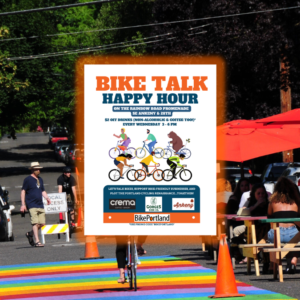


Thanks for reading.
BikePortland has served this community with independent community journalism since 2005. We rely on subscriptions from readers like you to survive. Your financial support is vital in keeping this valuable resource alive and well.
Please subscribe today to strengthen and expand our work.
What a great idea (this new series).
Funny how much trouble it can be to convince folks right here in the bikeportland comments that bikes can be serious freight vehicles.
http://bikeportland.org/2015/11/27/80-percent-of-portlands-top-ranked-restaurants-have-one-thing-in-common-169074#comment-6595704
Judging by the linked comment section, you seem to be equally difficult to convince of the economies of scale involved in a restaurant, especially when you yourself stated that “I’ll admit I know very little about supplying a restaurant…”
I’m with the others on that thread – some businesses just need higher volume deliveries to remain profitable, especially when the profit margin of small businesses, particularly restaurants, is so thin. Trucks offering large-scale deliveries can be electric (and smaller than they are right now). Road diets and robust protected bikeways can increase the safety of large vehicle/small vehicle/pedestrian interaction. Driving culture will need to shift (prioritizing the safety of peds and bikers, reducing distracted driving). And bikes can be a part of moving freight when appropriate and affordable for businesses.
Bikes are critical, but are are part of a future that will continue to be very multi-modal, and dependent on renewable energy.
“some businesses just need higher volume deliveries to remain profitable, especially when the profit margin of small businesses, particularly restaurants, is so thin.”
I’m trying to look around the next bend, when the economics you are talking about could change, or by some estimates will have changed. I never castigated anyone for *not using a cargo bike to make delivery of X or Y* – I’ve reserved my scorn for those who say it can’t be done, or is unreasonable, or expensive, or whatever.
I think that one of the keys to understanding this situation is that right now we take a lot of unusually high volume things for granted. If we look to a future where more people will work more, and more often by their hands and bodies and in groups, and that we will probably also have LESS convenient access to the same cup of coffee/hamburger for virtually no money, then yeah. Cargo bikes will be crucial in that “restaurant” economy situation. To plug small-volume, slow vehicles into the current equation doesn’t work, which, obviously, lots of people are willing to tell you.
I guess I sit in the middle. I don’t think cargo bikes could immediately and completely replace trucks in the city as a mode of cargo transport. (Which isn’t really what you’re suggesting, either.) But I don’t think our current, extremely wasteful model of “provisioning” is one that can last, either, so down the line, scaling EVERYTHING down will make a lot more sense.
What he said.
“To plug small-volume, slow vehicles into the current equation doesn’t work, which, obviously, lots of people are willing to tell you.”
Except that as several folks here have pointed out – it does.
And we’ve barely scratched the surface when it comes to exploring the ways in which cargo bikes and trailers can contribute in meaningful ways to how business is conducted today, and tomorrow. It isn’t as if tomorrow’s utilization of bikes for these purposes isn’t importantly a function of how we use them today. This is a process, a transition, and it is already underway.
But your points about how right here, right now we have gotten used to cheap fossil fuels, and the volume of goods that get moved around as a consequence are astute. Those volumes are staggering, and not very likely to continue at this high level much longer.
As a rider for B-Line I can assure you that our model of central aggregation and delivery within the urban core works. During the busier times of year (spring/summer/fall) I move 5000 lbs of organic produce over 4 business days, supplying restaurants like Prasad, Harlow, Bijou Cafe, etc.
Good to hear that I’m not daft. Thanks for that bit of ground truthing, Sam.
And we have 3-4 other riders moving similar volumes along side my routes.
ironically, the bike in this piece is an electric vehicle.
It looks like an electric-assist bicycle to me.
That’s got to be some serious low overhead compared to a car. Nice!
That’s a nice setup.
how does it compare to B-Line? I’ve always been interested in what the cost of both is compared to gas driven delivery.
Frito-Lay runs all-electric local delivery vans. I wonder how long a bicycle trailer would have to be to be competitive? How about double, or even triple, trailers?
There is little question that moving freight via EVs charged with renewables generates less carbon pollution than food-calorie-powered freight. (There is a bizarre denial about the impact of food consumption on carbon pollution.)
So you have any evidence to back up that claim?
Right. What will we eat in a sustainable future if not sustainable food? Granted, that’s not fair trade organic frozen pizza brought to you by carbon-tax-free fossil-fuel transport and cooling. Seems like most EVs are not being sustainably built — doing this locally is easier with a smaller, simpler vehicle. Melting 2lb of steel is twice as energy-intensive as melting 1lb of steel, and it’s probably not being melted with renewables. Converting a used car to woodgas is probably greener than buying a new leaf. Driving a leaf alone vs tearing down springwater on a smoky 35CC 2-stroke huffy maybe a toss-up.
Triple trailers? No problem. Bikes At Work (Ames, IA) have been doing this since the nineties: http://www.bikesatwork.com/blog/static/images/triple-bike-trailers.jpg
Also:
http://www.bikesatwork.com/blog/category/cargo-biking
I see a PPP bike and rider when I work out of a coffeeshop on 23rd Ave. There’s a steady grade when you are headed south on 23rd, and that’s the route she is always headed. It’s a good haul in the summer, but she is out there in the rain and super-cold weather. Badass.
Go ahead and say “but it’s electric”. No, it’s electric assist. If it was moped-style full electric, she’s good at pretending to be putting human power into it.
A 300-400lb bike doesn’t go uphill very fast on less than one hp. Depending on batteries, you may not be able to sustain even 500W on a long climb (500W will move 400lb 9mph up a 6% grade.) A rider contributing a steady 100W will make a big difference to range and speed.
I am curious about the economics of a bike delivery service.
For Portland Pedal Power, B-Line, etc:
– How long does the average delivery run take (in minutes/hours?)
– What is the pricing model for the service?
– How big is the average delivery (pounds?)